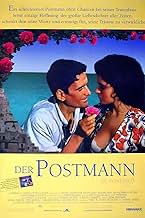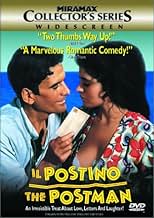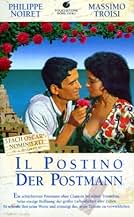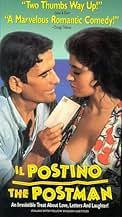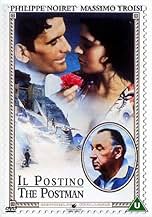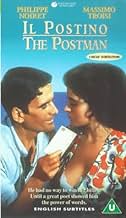CALIFICACIÓN DE IMDb
7.8/10
40 k
TU CALIFICACIÓN
Un sencillo cartero italiano aprende a amar la poesía mientras se encarga de llevar el correo a un famoso poeta, y la usa para conquistar a Beatriz, una belleza de la localidad.Un sencillo cartero italiano aprende a amar la poesía mientras se encarga de llevar el correo a un famoso poeta, y la usa para conquistar a Beatriz, una belleza de la localidad.Un sencillo cartero italiano aprende a amar la poesía mientras se encarga de llevar el correo a un famoso poeta, y la usa para conquistar a Beatriz, una belleza de la localidad.
- Dirección
- Guionistas
- Elenco
- Ganó 1 premio Óscar
- 31 premios ganados y 20 nominaciones en total
Calogero Azzaretto
- Bookseller
- (sin créditos)
Simona Caparrini
- Elsa Morante
- (sin créditos)
Angelo Casadei
- Cinema Spectator
- (sin créditos)
Chuck Riley
- Narrator of Theatrical Trailer
- (voz)
- (sin créditos)
Opiniones destacadas
A sweet, gentle film about a quiet postman who discovers the power of poetry in winning the heart of his true love.
Massimo Troisi gives a warm, wonderful performance as said postman, while Phillipe Noiret plays the poet Pablo Neruda. The setting, a sleepy Italian village, gives the film a cozy atmosphere, and it's got a lovely score to match.
One of the rare foreign-language films to be nominated for a Best Picture Academy Award, it lost to the thunderingly stupid "Braveheart." Mel Gibson could use a little poetry himself.
Grade: A
Massimo Troisi gives a warm, wonderful performance as said postman, while Phillipe Noiret plays the poet Pablo Neruda. The setting, a sleepy Italian village, gives the film a cozy atmosphere, and it's got a lovely score to match.
One of the rare foreign-language films to be nominated for a Best Picture Academy Award, it lost to the thunderingly stupid "Braveheart." Mel Gibson could use a little poetry himself.
Grade: A
10jotix100
Michael Radford, an English director, ought to be given credit for bringing this beautiful story to the screen. It speaks volumes that Mr. Radford achieves a triumph with a film that for all practical purposes should have been directed by an Italian. This is a timeless story of friendship, poetry and love set in a desolated island that was to be Pablo Neruda's home in exile.
The story is a simple one. Mario Ruoppolo, a poor man without a job, suddenly applies for a vacant position that will pay almost nothing, but by becoming a letter carrier he gets the chance of meeting a man that will make a deep impression on him and who will change his life completely.
Mario, the postman, is almost illiterate. He can read and write, with only the basic knowledge he probably picked up in the island school. He is allergic to fishing, and can't make a living like his father, and probably most of his ancestors before him. It's the time after WWII in which a poor Italy is still recovering from the devastation and defeat.
Pablo Neruda, the Chilean poet, finds a rustic home in the island. He is the most famous person ever to set foot in there. Mario is in charge for bringing Pablo his packages and mail. An easy friendship develops between them. Like everyone else in the island, Mario is impressed by the foreigner. In trying to imitate his poet friend, Mario awakens to all the beauty around him and discovers love with the gorgeous local girl, Beatrice Russo.
The film's mood changes right after Pablo Neruda and his wife receive assurances they can go back to their native land. This leaves Mario in a sad state, but now that he is married, he has other responsibilities to live for. Neruda had awakened in Mario a desire to speak for himself and to seek justice.
This is a film totally dominated by the late Italian actor Massimo Troisi, who as Mario, completely captures us by just being a simple soul with no malice. Mr. Troisi is splendid in his take of this poor man who discovers beauty and poetry late in his life. Philippe Noiret, is Pablo Neruda. Mr. Noiret makes a great contribution as the man who sees beauty everywhere and translates it into poetry. Maria Grazia Cucinotta is the beautiful Beatrice, the woman who loves Mario. Renato Scarpa and Linda Moretti, play minor roles with success.
"Il Postino" is helped by the magnificent cinematography of Franco di Giacomo who captures the island in all its splendor. The music score is another asset. Luis Bacalov's tuneful background music adds another layer in this film rich texture.
This film is an excellent way to be introduced to Pablo Neruda's poetry, even if it's only for the curiosity the film will give even a casual viewer. Thanks to Michael Radford for a poetic view of this lonely place where two people meet and are changed forever.
The story is a simple one. Mario Ruoppolo, a poor man without a job, suddenly applies for a vacant position that will pay almost nothing, but by becoming a letter carrier he gets the chance of meeting a man that will make a deep impression on him and who will change his life completely.
Mario, the postman, is almost illiterate. He can read and write, with only the basic knowledge he probably picked up in the island school. He is allergic to fishing, and can't make a living like his father, and probably most of his ancestors before him. It's the time after WWII in which a poor Italy is still recovering from the devastation and defeat.
Pablo Neruda, the Chilean poet, finds a rustic home in the island. He is the most famous person ever to set foot in there. Mario is in charge for bringing Pablo his packages and mail. An easy friendship develops between them. Like everyone else in the island, Mario is impressed by the foreigner. In trying to imitate his poet friend, Mario awakens to all the beauty around him and discovers love with the gorgeous local girl, Beatrice Russo.
The film's mood changes right after Pablo Neruda and his wife receive assurances they can go back to their native land. This leaves Mario in a sad state, but now that he is married, he has other responsibilities to live for. Neruda had awakened in Mario a desire to speak for himself and to seek justice.
This is a film totally dominated by the late Italian actor Massimo Troisi, who as Mario, completely captures us by just being a simple soul with no malice. Mr. Troisi is splendid in his take of this poor man who discovers beauty and poetry late in his life. Philippe Noiret, is Pablo Neruda. Mr. Noiret makes a great contribution as the man who sees beauty everywhere and translates it into poetry. Maria Grazia Cucinotta is the beautiful Beatrice, the woman who loves Mario. Renato Scarpa and Linda Moretti, play minor roles with success.
"Il Postino" is helped by the magnificent cinematography of Franco di Giacomo who captures the island in all its splendor. The music score is another asset. Luis Bacalov's tuneful background music adds another layer in this film rich texture.
This film is an excellent way to be introduced to Pablo Neruda's poetry, even if it's only for the curiosity the film will give even a casual viewer. Thanks to Michael Radford for a poetic view of this lonely place where two people meet and are changed forever.
Lyrical, moving and beautifully photographed gentle comedy in which an exiled Chilean poet inspires his Italian postman to woo and marry a local girl. Massimo Troisi gives a wonderfully contained performance as the postman who learns to see the beauty in poetry and his home on an Italian island. Philippe Noiret plays the poet Pablo Neruda with the usual assuredness. It is difficult not to be moved by the simple beauty of the film.
"Il Postino" is a movie that received oodles of critical acclaim upon its release in 1994. While I don't think it was as good as advertised, I understand why it received such praise. In a movie world that is filled with dry and unamusing romance stories, "Il Postino" is a relatively lush and beautiful tale.
The plot is fairly simple but loaded with subtleties that allow, even encourage, multiple viewings. Mario (Massimo Troisi) longs for something more than his simple fisherman life on an Italian island, so he takes a small job as a postman, delivering mail to famed romantic poet Pablo Neruda (Phillipe Noiret), who is living in exile on the same island. Over time, they develop a relationship that is based on Neruda aiding Mario in wooing his beloved Beatrice (Maria Grazia Cucinotta).
The final act is where the film makes the leap from well-made standard fare to something greater. With a couple plausible plot developments, characters and relationships are deepened beyond a basic love story, to a place that accents everything that happens leading up to that point. I can't say much else without giving things away, but stick with the movie to the end, even if you're dragging midway through.
As you might expect from an Italian film, "Il Postino" has a very European feel. The passion of Italy is present throughout, explained through lifestyles, literal and metaphorical imagery, and the emotions of the characters. The setting is far from the bustling dollar-driven society in which Americans dwell, and a movie like this wouldn't get made in America, because the cultures are drastically different.
The film's star, Massimo Troisi, is excellent. He embodies everyman qualities exceptionally, similar to Tom Hanks, yet with more...something. Soul perhaps? He, like the entire film, is just more European, and I hope you understand what I mean by that. Noiret portrays Neruda perfectly, expressing his romantic ways through both words and actions. Everyone else is very good, although no one stands out; the overall anonymity of the cast aids the viewer in establishing culture as well.
The cinematography and the scenery it presents is often breathtaking, although not in the sweeping manner of something like The Lord of the Rings. Rather, cinematographer Franco Di Giacomo wisely chose to let the pictures speak for themselves. The elegant cliffs, white-capped waves, and rolling topography of the island gently yet firmly frame and support the story. A straight-forward tale should have suitable pictures, and "Il Postino" meets that requirement.
The film is touted as a romantic comedy, and it is, although not in the traditional sense. The comedy isn't slapstick and won't elicit bushels of laughter. But there is an underlying sense of humor laced through the whole movie, often in simple movements, tasks, or occurrences.
All of this combines to present something like a fairy tale replete with Italian heart and soul. "Il Postino" won't blow you away, but its tender lessons about life, love, and friendship will stick with you for some time, urging another viewing.
Bottom Line: A very European romance that is better than most anything Hollywood can conjure up. 8/10.
(If you like the film, get the Collector's Edition DVD; it's quite good.)
The plot is fairly simple but loaded with subtleties that allow, even encourage, multiple viewings. Mario (Massimo Troisi) longs for something more than his simple fisherman life on an Italian island, so he takes a small job as a postman, delivering mail to famed romantic poet Pablo Neruda (Phillipe Noiret), who is living in exile on the same island. Over time, they develop a relationship that is based on Neruda aiding Mario in wooing his beloved Beatrice (Maria Grazia Cucinotta).
The final act is where the film makes the leap from well-made standard fare to something greater. With a couple plausible plot developments, characters and relationships are deepened beyond a basic love story, to a place that accents everything that happens leading up to that point. I can't say much else without giving things away, but stick with the movie to the end, even if you're dragging midway through.
As you might expect from an Italian film, "Il Postino" has a very European feel. The passion of Italy is present throughout, explained through lifestyles, literal and metaphorical imagery, and the emotions of the characters. The setting is far from the bustling dollar-driven society in which Americans dwell, and a movie like this wouldn't get made in America, because the cultures are drastically different.
The film's star, Massimo Troisi, is excellent. He embodies everyman qualities exceptionally, similar to Tom Hanks, yet with more...something. Soul perhaps? He, like the entire film, is just more European, and I hope you understand what I mean by that. Noiret portrays Neruda perfectly, expressing his romantic ways through both words and actions. Everyone else is very good, although no one stands out; the overall anonymity of the cast aids the viewer in establishing culture as well.
The cinematography and the scenery it presents is often breathtaking, although not in the sweeping manner of something like The Lord of the Rings. Rather, cinematographer Franco Di Giacomo wisely chose to let the pictures speak for themselves. The elegant cliffs, white-capped waves, and rolling topography of the island gently yet firmly frame and support the story. A straight-forward tale should have suitable pictures, and "Il Postino" meets that requirement.
The film is touted as a romantic comedy, and it is, although not in the traditional sense. The comedy isn't slapstick and won't elicit bushels of laughter. But there is an underlying sense of humor laced through the whole movie, often in simple movements, tasks, or occurrences.
All of this combines to present something like a fairy tale replete with Italian heart and soul. "Il Postino" won't blow you away, but its tender lessons about life, love, and friendship will stick with you for some time, urging another viewing.
Bottom Line: A very European romance that is better than most anything Hollywood can conjure up. 8/10.
(If you like the film, get the Collector's Edition DVD; it's quite good.)
his performance is essence of this adorable film. his character is so careful created that its fragility, humor, innocence, light of details are magnificent. he don't play a role but he is "il postino" . and this fact transforms entire scene. the story of Neruda exile is only arena for emotions of a small man on an Italian isle. the beautiful Beatrice is brick for his delicate happiness. Neruda himself is not exactly a mentor but a gardener. and the music, the extraordinary music, it is the soul of entire poetry. because a poetry is this movie who has as roots poems. very delicate, nice, nostalgic, melancholic, subtle, intelligent, precise, it is wonderful homage to a way to discover life as fundamental miracle. to feel the nuances of love, friendship, to be humble, modest and daring in same time, to feel gratitude as form of respiration. beautiful and impressive. touching. and unique. story of a postman. legacy of Massimo Troisi.
¿Sabías que…?
- TriviaWriter/co-director/star Massimo Troisi postponed heart surgery so he could complete the film. The day after filming was complete, he suffered a fatal heart attack.
- Citas
Mario Ruoppolo: Poetry doesn't belong to those who write it; it belongs to those who need it.
- Versiones alternativasThe Italian version of the film includes an additional title credit for Massimo Troisi, listed as co-director of the movie together with Michael Radford.
- ConexionesEdited into Laggiù qualcuno mi ama (2023)
- Bandas sonorasMadreselva
Written by Francisco Canaro (as F. Canaro) and Luis César Amadori (as L.C. Amadori)
Performed by Carlos Gardel
Courtesy of E. Musical Pirovano
Selecciones populares
Inicia sesión para calificar y agrega a la lista de videos para obtener recomendaciones personalizadas
Detalles
- Fecha de lanzamiento
- Países de origen
- Sitios oficiales
- Idiomas
- También se conoce como
- The Postman
- Locaciones de filmación
- Pollara, Salina Island, Aeolian Islands, Messina, Sicily, Italia(rural and beach scenes)
- Productoras
- Ver más créditos de la compañía en IMDbPro
Taquilla
- Presupuesto
- USD 3,000,000 (estimado)
- Total en EE. UU. y Canadá
- USD 21,848,932
- Fin de semana de estreno en EE. UU. y Canadá
- USD 95,310
- 18 jun 1995
- Total a nivel mundial
- USD 21,901,256
- Tiempo de ejecución1 hora 48 minutos
- Color
- Mezcla de sonido
- Relación de aspecto
- 1.66 : 1
Contribuir a esta página
Sugiere una edición o agrega el contenido que falta

Principales brechas de datos
What is the streaming release date of El cartero (1994) in Brazil?
Responda



